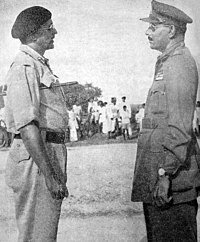Syed Ahmed El Edroos
Syed Ahmed El-Edroos | |
|---|---|
 Syed Ahmed El Edroos | |
| Born | 3 March 1899 Sangareddy, Hyderabad State, British India |
| Died | 20 July 1962 (aged 63) Bangalore, Mysore State, India |
| Allegiance | |
| Rank | Commander-in-chief, Major general |
| Unit | Hyderabad Lancers Hyderabad State Forces |
| Battles / wars | World War I World War II Operation Polo |
Syed Ahmed El-Edroos (Arabic: سيد أحمد العيدروس, romanized: Saiyid Aḥmad al-‘aidarūs; 3 March 1899 – 20 July 1962) was the commander-in-chief of the Hyderabad State Forces at the time of the annexation of Hyderabad State by India in 1948.
Life

Syed Ahmed El-Edroos was born into a family belonging to the Ba'Alawi Sadah, a Hashemite tribe that had been settled in Hadhramaut, he was a descendant of Abu Bakr Al-Aydarus, who descended from Ahmad Al-Muhajir, who in turn was a descendant of Ali Al-Uraydi, grandson of Ali Al-Sajjad, son of Imam Husayn ibn Ali, grandson of the Prophet Muhammad.[1] His grandfather and father had immigrated from Yemen to Hyderabad in 1887, with El-Edroos being born upon Indian soil in 1899, making him a first generation Indian.[1] His maternal family is said to have descendant from an Arab general who had fought against the Byzantines in the 7th Century.[1] He was commissioned in 1919. El-Edroos participated in both World Wars, serving in the 1st Hyderabad Lancers.
El-Edroos was a close confidante and trusted aide of the Nizam of Hyderabad.[citation needed] His brothers were also senior officers and distinguished members of the Nizam's army.
He was ready for a war but was advised by the Nizam of Hyderabad, Mir Osman Ali Khan, not to fight and surrendered to the Indian Army forces outside of Hyderabad city so that there would be no bloodshed of innocent people.[2]
In September 1948 El-Edroos held the rank of Major-General and Commander of the State Army of Hyderabad.[3] This numbered 6,000 men and consisted of three armoured regiments, a horse cavalry regiment, 11 infantry battalions and artillery. It was supported by 18,000 poorly armed and trained irregulars. In the course of Operation Polo, the Indian Army was able to scatter this mixed force in five days of fighting. General El-Edroos, who had advised the Nizam against opposing the entry of Indian forces, surrendered on 17 September. In 1950, General Edroos was arrested on the allegation of helping Mir Laiq Ali to escape to Pakistan. After two months he was released after an enquiry did not find any evidence against him. He left Hyderabad and settled in Bangalore. His children emigrated to Pakistan. [4]
Autobiography
His autobiography Hyderabad of the Seven Loaves was published in April 1994 and presented a historical account of the Asaf Jahi dynasty with an autobiographical sketch of the author, covering the events of Hyderabad's merger with the Indian Union. It narrates several anecdotes and facts about the city during the Nizami reign.[5] The book also contains some rare pictures of the royal and aristocratic events that took place at the time.[citation needed]
References
- ^ a b c Khan, Zeenath (13 September 2023). "The tragic tale of General Edroos, who fought a losing battle for the princely state of Hyderabad". Scroll.in. Retrieved 16 January 2025.
- ^ Leonard, Karen Isaksen (2007). Locating Home: India's Hyderabadis Abroad. Stanford University Press. pp. 25, 111. ISBN 978-0-8047-5442-2.
- ^ Khan, Asghar Ali (15 September 2019). "September 17, 1948—a sweeping 'invasion' of Hyderabad State". The Siasat Daily. Retrieved 2 August 2022.
- ^ Khan, Zeenat (13 September 2023). "The tragic tale of General Edroos, who fought a losing battle for the princely state of Hyderabad". Scroll.in. Retrieved 14 June 2024.
- ^ Khalidi, Omar (1994). "Memoirs of General El Edroos". Pakistan Historical Society. 42 (2): 181–213.
External links
- INDIA: The Happy War, Time (magazine), 27 September 1948
- End of a State, Life (magazine), 11 October 1948
- Video of Soldiers of NIZAMS of HYDERABAD
